Accusation and death
In 66, Anteius was detained in Rome by Nero after having been denounced, along with Publius Ostorius Scapula, by Antistius Sosianus. [4] Because an accusation -- delatio -- would mean the accuser might receive some portion of the property of the accused, this could be quite lucrative in imperial Rome. The grounds for this accusation were that Sosianus said he had discovered that Anteius had set up a yearly pension for the exiled Greek astrologer Pammenes -- at this time, use of astrology could result in a charge of magic and treason against the emperor. [5] As proof, Sosianus produced a letter from Pammenes to Anteius, as well as Pammenes's notes on Anteius's and Nero's future careers, ostensibly requested by Anteius. [6]
The accused quickly became the condemned, without much in the way of a formal trial, if any. Fear of Nero, and of getting swept up in the accusation, was so great that none of Anteius's friends even stepped forward to witness his last will and testament. Finally, the praetorian prefect Tigellinus, did it, warning Anteius not to "procrastinate" with preparations for his death. [5] Tigellinus was himself a noted profiteer from such accusations, and it's likely he himself profited by witnessing the will. [7]
Anteius was already disliked by Nero on account of his intimacy with Nero's hated mother Agrippina, and was forced by Nero to kill himself in 67. [8] Anteius first took poison, which did not work, and after which he cut open his own veins. [5]
This Anteius's cognomen "Rufus" is not recorded in the account of Tacitus, but is ascribed to him by the scholar Edmund Groag based on inscriptions in his Prosopographia Imperii Romani . [1]
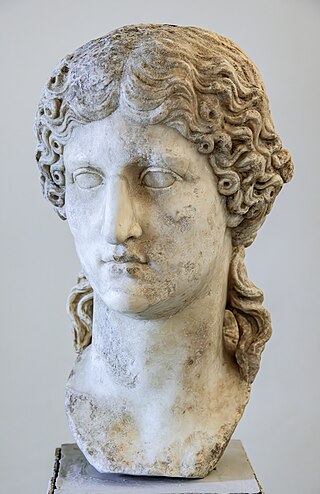
(Vipsania) Agrippina the Elder was a prominent member of the Julio-Claudian dynasty. She was the daughter of Marcus Vipsanius Agrippa and Augustus' daughter, Julia the Elder. Her brothers Lucius and Gaius Caesar were the adoptive sons of Augustus, and were his heirs until their deaths in AD 2 and 4, respectively. Following their deaths, her second cousin Germanicus was made the adoptive son of Tiberius, Augustus' stepson, as part of the succession scheme in the adoptions of AD 4. As a result of the adoption, Agrippina was wed to Germanicus in order to bring him closer to the Julian family.

Julia Agrippina, also referred to as Agrippina the Younger, was Roman empress from AD 49 to 54, the fourth wife and niece of emperor Claudius, and the mother of Nero.
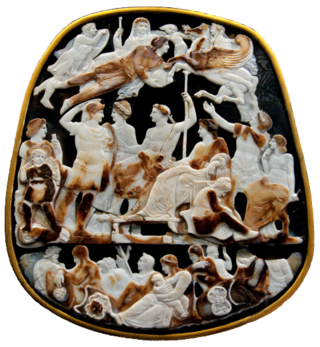
The Julio-Claudian dynasty comprised the first five Roman emperors: Augustus, Tiberius, Caligula, Claudius, and Nero.
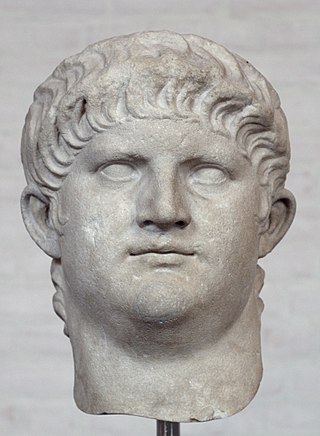
Nero Claudius Caesar Augustus Germanicus was a Roman emperor and the final emperor of the Julio-Claudian dynasty, reigning from AD 54 until his death in AD 68.

Tiberius Julius Caesar Augustus was Roman emperor from AD 14 until 37. He succeeded his stepfather Augustus, the first Roman emperor. Tiberius was born in Rome in 42 BC to Roman politician Tiberius Claudius Nero and his wife, Livia Drusilla. In 38 BC, Tiberius's mother divorced his father and married Augustus. Following the untimely deaths of Augustus's two grandsons and adopted heirs, Gaius and Lucius Caesar, Tiberius was designated Augustus's successor. Prior to this, Tiberius had proved himself an able diplomat and one of the most successful Roman generals: his conquests of Pannonia, Dalmatia, Raetia, and (temporarily) parts of Germania laid the foundations for the empire's northern frontier.

The 30s decade ran from January 1, AD 30, to December 31, AD 39.
Ofonius Tigellinus was a prefect of the Roman imperial bodyguard, known as the Praetorian Guard, from 62 until 68, during the reign of emperor Nero. Tigellinus gained imperial favour through his acquaintance with Nero's mother Agrippina the Younger, and was appointed prefect upon the death of his predecessor Sextus Afranius Burrus, a position Tigellinus held first with Faenius Rufus and then Nymphidius Sabinus.

Publius Clodius Thrasea Paetus, Roman senator, who lived in the 1st century AD. Notable for his principled opposition to the emperor Nero and his interest in Stoicism, he was the husband of Arria, who was the daughter of A. Caecina Paetus and the elder Arria, father-in-law of Helvidius Priscus, and a friend and relative by marriage of the poet Persius. Thrasea was the most prominent member of the political faction known today as the Stoic Opposition.
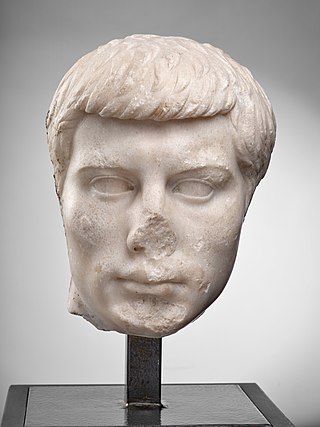
Tiberius Julius Caesar Nero, known as Tiberius Gemellus, was the son of Drusus and Livilla, the grandson of the Emperor Tiberius, and the cousin of the Emperor Caligula. Gemellus is a nickname meaning "the twin". His twin brother, Germanicus Gemellus, died as a young child in AD 23. His father and older cousins died, and are suspected by contemporary sources as having been systematically eliminated by the powerful praetorian prefect Sejanus. Their removal allowed Gemellus and Caligula to be named joint-heirs by Tiberius in 35, a decision that ultimately resulted in Caligula assuming power and having Gemellus killed in late 37 or early 38.

Drusus Caesar was the grandson by adoption and heir of the Roman emperor Tiberius, alongside his brother Nero. Born into the prominent Julio-Claudian dynasty, Drusus was the son of Tiberius' general and heir, Germanicus.
Rubellius Plautus was a Roman noble and a political rival of Emperor Nero. Through his mother Julia, he was a relative of the Julio-Claudian dynasty. He was the grandson of Drusus, and the great-grandson of Tiberius and his brother Drusus. Through his great-grandmothers Vipsania Agrippina and Antonia Minor, he was also descended from Marcus Vipsanius Agrippa and Mark Antony. He was descended from Augustus' sister Octavia Minor, herself a grand-niece of Julius Caesar.

Nero Julius Caesar was the adopted grandson and heir of the Roman emperor Tiberius, alongside his brother Drusus. Born into the prominent Julio-Claudian dynasty, Nero was the son of Tiberius' general and heir, Germanicus. After the deaths of his father and of Tiberius' son, Drusus the Younger, Nero and his brother Drusus were adopted together by Tiberius in September AD 23. As a result of being heirs of the emperor, he and his brother enjoyed accelerated political careers.
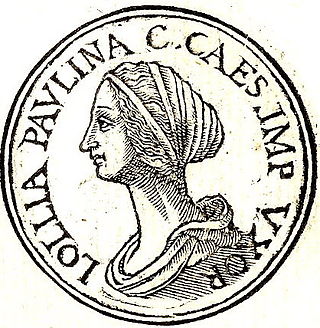
Lollia Paulina was a Roman empress for six months in 38 as the third wife of the Roman emperor Caligula.
Gaius Sallustius Passienus Crispus was a prominent figure in the Roman Empire during the first century. He held the consulship twice, and was stepfather of the future emperor Nero.
Gaius Ummidius Durmius Quadratus was a Roman senator of the Principate. He was the first member of the Ummidii to reach the office of consul in his family, or a homo novus. Quadratus is also known for his tenure as governor of Syria from c. 50 until his death.

Claudia Octavia was a Roman empress. She was the daughter of the Emperor Claudius and Valeria Messalina. After her mother's death and father's remarriage to her cousin Agrippina the Younger, she became the stepsister of the future Emperor Nero. She also became his wife, in a marriage between the two which was arranged by Agrippina.
Nero is an Italian-British-Spanish television film, part of the Imperium series; it was made film available on DVD as of November 2005 in the U.S. and Canada. Produced by EOS Entertainment and Lux Vide for RAI and Telecinco.
Cossutianus Capito was a Roman senator and delator, often acting on behalf of the contemporary Roman emperor during the Principate. Tacitus offers a hostile portrait of Capito in his Annales, describing him as a "man stained with much wickedness", and as having "a heart eager for the worst wickedness".
Publius Suillius Rufus was a Roman senator who was active during the Principate. He was notorious for his prosecutions during the reign of Claudius; and he was the husband of the step-daughter of Ovid. Rufus was suffect consul in the nundinium of November-December 41 as the colleague of Quintus Ostorius Scapula.
Junia Silana was a Roman patrician. She was the sister of Junia Claudilla, the first wife of Caligula, before he became emperor. Silana was a prominent figure in the power struggles that transpired in the reign of three different emperors. She was also noted for her close relationship with Julia Agrippina.
![]() This article incorporates text from a publication now in the public domain : Smith, William (1870). "P. Anteius". In Smith, William (ed.). Dictionary of Greek and Roman Biography and Mythology . Vol. 1. p. 183.
This article incorporates text from a publication now in the public domain : Smith, William (1870). "P. Anteius". In Smith, William (ed.). Dictionary of Greek and Roman Biography and Mythology . Vol. 1. p. 183.










